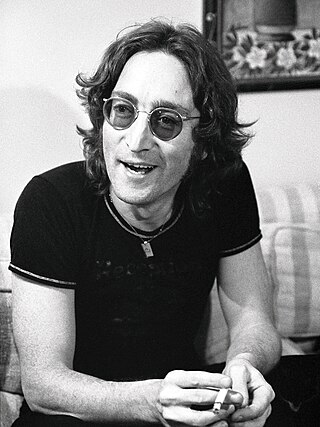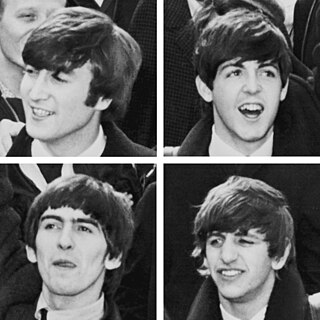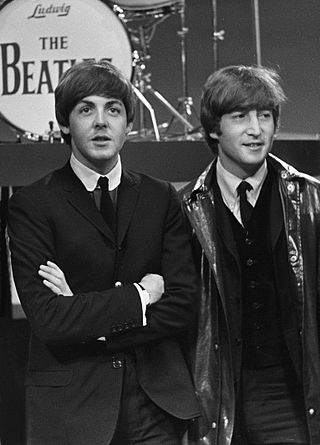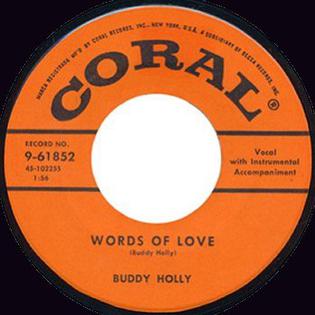
John Winston Ono Lennon was an English singer, songwriter and musician. He gained worldwide fame as the founder, co-lead vocalist and rhythm guitarist of the Beatles. His work included music, writing, drawings and film. His songwriting partnership with Paul McCartney remains the most successful in history as the primary songwriters in the Beatles.

The Beatles were an English rock band formed in Liverpool in 1960. The core lineup of the band comprised John Lennon, Paul McCartney, George Harrison and Ringo Starr. They are widely regarded as the most influential band of all time and were integral to the development of 1960s counterculture and the recognition of popular music as an art form. Rooted in skiffle, beat and 1950s rock 'n' roll, their sound incorporated elements of classical music and traditional pop in innovative ways. The band also explored music styles ranging from folk and Indian music to psychedelia and hard rock. As pioneers in recording, songwriting and artistic presentation, the Beatles revolutionized many aspects of the music industry and were often publicized as leaders of the era's youth and sociocultural movements.
Apple Records is a British record label founded by the Beatles in 1968 as a division of Apple Corps Ltd. It was initially intended as a creative outlet for the Beatles, both as a group and individually, plus a selection of other artists including Mary Hopkin, James Taylor, Badfinger and Billy Preston. In practice, the roster had become dominated by the mid-1970s with releases of the former Beatles as solo artists. Allen Klein managed the label from 1969 to 1973, then it was managed by Neil Aspinall on behalf of the Beatles and their heirs. Aspinall retired in 2007 and was replaced by Jeff Jones. Jones stepped down on October 21st, 2024.
"How Do You Sleep?" is a song by English rock musician John Lennon from his 1971 album Imagine.

Abbey Road is the eleventh studio album by the English rock band the Beatles, released on 26 September 1969, by Apple Records. It is the last album the group recorded, although Let It Be (1970) was the last album completed before the band's break-up in April 1970. It was mostly recorded in April, July, and August 1969, and topped the record charts in both the United States and the United Kingdom. A double A-side single from the album, "Something" / "Come Together", was released in October, which also topped the charts in the US.

Lennon–McCartney was the songwriting partnership between English musicians John Lennon (1940–1980) and Paul McCartney of the Beatles. It is widely considered one of the greatest, best known and most successful musical collaborations ever by records sold, with the Beatles selling over 600 million records worldwide as of 2004. Between 5 October 1962 and 8 May 1970, the partnership published approximately 180 jointly credited songs, of which the vast majority were recorded by the Beatles, forming the bulk of their catalogue.

The Plastic Ono Band was a rock band and Fluxus-based artist collective formed by John Lennon and Yoko Ono in 1968-9 for their collaborative musical and sound art projects, films, conceptual art projects and eventual solo LPs. The creation of The Plastic Ono Band, which began in 1967 with Ono's idea for an art exhibition in Berlin, allowed Lennon to separate his artistic output from that of The Beatles.

"Come Together" is a song by the British rock band the Beatles, written by John Lennon and credited to Lennon–McCartney. The song is the opening track on the band's 1969 album Abbey Road. It was also a double A-side single in the United Kingdom with "Something", reaching No. 4 in the UK charts.

"Thank You Girl" is a song recorded by the English rock band the Beatles, written by John Lennon and Paul McCartney. It was issued as the B-side of the single "From Me to You", which was recorded on the same day. While not released on an LP in the United Kingdom until Rarities in 1978, the song was the second track on The Beatles' Second Album in the United States. As the B-side of the single "Do You Want to Know a Secret", it hit No. 35 on the Billboard Hot 100 in the spring of 1964.

"You've Got to Hide Your Love Away" is a song by the English rock band the Beatles. It was written and sung by John Lennon and released on the album Help! in August 1965.

"The Continuing Story of Bungalow Bill" is a song written by John Lennon, and released by the English rock band the Beatles on their 1968 double album The Beatles. The song was recorded at EMI Studios on 8 October 1968 and was completed the same day. The group also started and completed the Lennon-composed "I'm So Tired" during the same recording session. Along with Lennon, the song also contains co-lead vocals by Yoko Ono, the only song recorded by the group to feature lead vocals by a non-member.

"Words of Love" is a song written by Buddy Holly and released as a single in 1957.

"Misery" is a song by the English rock band the Beatles from their 1963 debut album Please Please Me. It was co-written by John Lennon and Paul McCartney. According to Lennon, "It was kind of a John song more than a Paul song, but it was written together." McCartney was to say: "I don't think either one of us dominated on that one, it was just a hacking job."

"Yes It Is" is a song by the English rock band the Beatles. Written by John Lennon, it was first released in 1965 as the B-side to "Ticket to Ride". It features some of the Beatles' most complex and dissonant three-part vocal harmonies and showcases George Harrison's early use of volume pedal guitar. Ian MacDonald describes the song as having "rich and unusual harmonic motion."
Northern Songs Ltd was a limited company founded in 1963, by music publisher Dick James, artist manager Brian Epstein, and songwriters John Lennon and Paul McCartney of the Beatles, to publish songs written by Lennon and McCartney. In 1965, it was decided to make Northern Songs a public company, to reduce their income tax burden.
The Beatles were an English rock band, active from 1960 until 1970. From 1962 onwards, the band's members were John Lennon, Paul McCartney, George Harrison and Ringo Starr. Their break-up is attributed to numerous factors, including: the strain of the Beatlemania phenomenon, the 1967 death of their manager Brian Epstein, bandmates' resentment of McCartney's perceived domineering behaviour, Lennon's heroin use and his relationship with Yoko Ono, Harrison's increasingly prolific songwriting, the floundering of Apple Corps, the Get Back project and managerial disputes.

"Don't Let Me Down" is a song by the English rock band the Beatles, recorded in 1969 during the Let It Be sessions. It was written by John Lennon and credited to the Lennon–McCartney songwriting partnership. The band recorded the song with keyboardist Billy Preston; the single release with "Get Back" was credited to "the Beatles with Billy Preston". Originally released as a B-side, producer Phil Spector excluded the song from Let It Be. The song's first appearance on an album was on the 1970 collection Hey Jude.
Grapefruit were a London-based British band of the late 1960s, brought together by Terry Doran of Apple Publishing, a music publishing company started and owned by the Beatles. Their brand of music was a typical late 1960s blend of rock, which they often fused with psychedelic effects such as phasers and vocoders, or classical arrangements.

"That Means a Lot" is a song written mainly by Paul McCartney, and credited to Lennon–McCartney. It was released in 1965 by P.J. Proby. Proby's version reached #24 on the NME chart. Prior to the release by Proby, the Beatles recorded a version that was intended for the Help! film and soundtrack album. The Beatles were dissatisfied with the song and their version was not released until the Anthology 2 CD in 1996.
"Grow Old with Me" is one of the final songs written by John Lennon. It was first recorded by Lennon as a demo while in Bermuda. A handwritten lyric sheet for the song is dated July 5, 1980 Fairyland Bermuda. The song was first released on the posthumous album Milk and Honey in 1984. It was also rumored to be among the songs planned as a possible reunion single by his former bandmates during the making of The Beatles Anthology.












